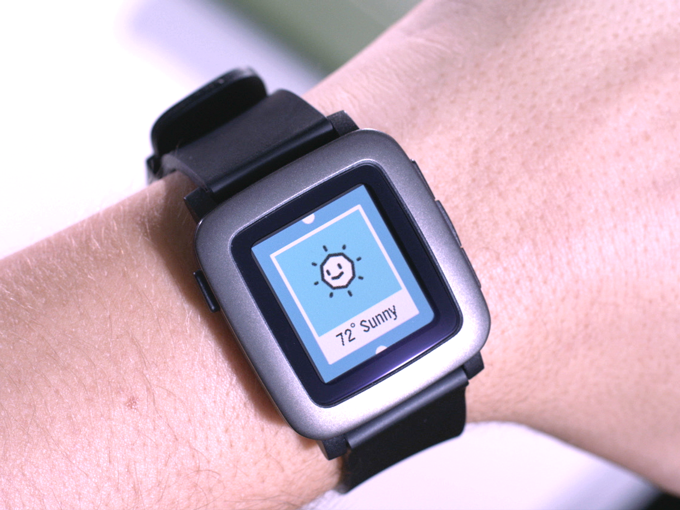

The iOS app was also approved in January 2013, which helped with the growing momentum behind the device.
The success of the Pebble attracted attention, and at this time Pebble was helped by a $15m funding injection led by Charles River Ventures and others. This allowed Pebble to fulfill 70,000 of the original 85,000 orders by May 2013.
And 2013 was perhaps its best year, as Best Buy (a giant American electronics retailer), began selling Pebble smartwatches in July. It should be noted that 190,000 people had signed up to its pre-order campaign, and all the Pebble devices were sold out within five days.
By 31 December 2014, Pebble had sold one million smartwatches.
Pebble did not sit still. January 2014 saw the arrival of the Time Steel with a Kickstarter campaign that raised $20.3 million from over 75,000 backers.
But 2014 was also the year that saw the arrival of Google’s Android Wear, and Apple also revealed it was planning its own smartwatch, but this only arrived in April 2015.
Pebble responded to this growing competition with prices cuts and support for Android wear apps.
In February 2015, it also developed the Pebble Time, but somewhat controversially decided to stick with an e-paper display. It also offered the Color model which came with a stainless steel bezel and a mic for voice commands.
The Pebble Time Kickstarter campaign goal of $500,000 was reached in just seventeen minutes. By the end of the day it had reached $6.5m, and by of the month had reached an astonishing $20.3million.
But by May 2015 reports had began to surface that Pebble as a company was in financial difficulties, and was seeking $10m in order to stay afloat. It did manage to raise $28m in funding and debt, but this was not enough.
Despite these money worries, the Time Round arrived in September 2015, which ditched the traditional square design of the Pebble in favour of a round clockface (but again keeping the e-paper display).
By March 2016 Pebble was forced to cut prices again as competition ramped up, and the same month Pebble announced it was cutting 25 percent of its workforce (40 people)
Then in May, upgraded versions of the Time and original Pebble were released, along with a fitness focused Core (its first and last none-smartwatch device).
But by December it was all over for Pebble.
On 7 December 2016, Pebble officially announced that the company would be shut down and would no longer make any devices. It would also not honour any existing warranties, much to the disappointment of users who lamented the loss and found their watches would no longer be supported.
It seemed briefly as though rival Fitbit would be the rescuer with its $40m acquisition of Pebble.
But it soon became clear that Fitbit’s acquisition was not a lifeline for Pebble. In fact it was a fire sale.
Fitbit essentially cherry picked the best assets and intellectual property of Pebble, and then killed off the rest. Most of Pebble’s 100 staff were made redundant, and all their stock options was suddenly worthless.
It was a very sad end for an innovative Silicon Valley startup, who dared to go outside traditional routes to market. But in the end it could not maintain its own momentum once heavyweight rivals such as Google, Samsung and Apple had entered the smartwatch sector.
Some of its technology has found its way into the Fitbit Ionic, released this week, but it will do little for those who still miss their Pebble.
Quiz: What do you know about wearable technology?
Page: 1 2
After being 'retired' by Intel's board of directors, ex-CEO Pat Gelsinger has joined a VC…
President touts easing Chinese tariffs to facilitate TikTok sale, and also implements 25 percent tariff…
Copyright lawsuit against OpenAI and Microsoft from The New York Times and other newspapers can…
New chapter for famous name from Internet's early days, Napster, has been acquired and will…
Solving not-spots? Ofcom proposal to make UK the first European country to allow ordinary smartphones…
Pioneering robotaxi service from Alphabet's Waymo to go live in Washington DC next year, as…